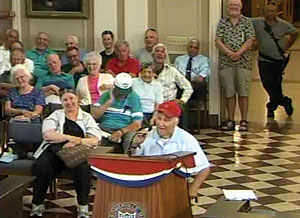
Concerned individuals voiced their opinions of the Group Insurance Commission at last week’s Board of Aldermen Finance Committee meeting.
By Andrew Firestone
The scene at a public hearing of the Board of Aldermen Finance Committee was one of caution this last Wednesday, July 27, as city employees spoke out against the joining of Group Insurance Commission. Despite Mayor Joseph Curtatone’s assurance that the savings would amount to a total of $9.3 million, aldermen took note of the worries and concerns of the citizenry, and vowed to further look into alternatives, and to discuss the issue more deeply.
The decision was largely brought on by the outpouring of some of the 2,780 subscribers who came forward to let their feelings be known to the aldermen.
A key issue that was discussed again and again was that the deadline of September 1, which is the latest the city can sign onto the plan if the wish to join in fiscal year 2012, leaves too little time for the public employee committee to analyze the advantages of a design plan. This was a concern echoed by Aldermen Bill White, Bruce Desmond, and chairwoman of the Finance Committee Maryann Heuston.
“To bring everyone up here on July 27… and try to get this through in a hurry-up offense is doing a disservice to this process,” said President of Local 76 Firemen Jay Colbert. “GIC is not a magic elixir. They don’t have a specific way of doing healthcare cheaper. It just shifts costs.”
“You’re giving up a lot of freedom and control of your plan,” said city employee Peter Blankey. “It’s like Medicare; if all of a sudden the governor decides to cut spending, we will receive unilateral increases in costs across the board.”
The meeting also saw appearances by retirees, who said they were concerned about the costs of their medical bills and the choice of their doctors under the plan. The GIC allows users to join plans like Tufts and Harvard Pilgrim, but does not include some plans used by some employees.
“If the city wants to save a lot of money, they can probably let all the men in the fire department go, and have a volunteer fire department,” said 40-year city employee Mickey Curtin “But how many of the people would want to volunteer to do the job that the firemen are called to do each and every day, risking their lives?”
“There’s really no savings to the employees,” he said.
Some harsh criticism came from retiree Rosemary Roderick, who says that she and her husband could not abide such a plan. “We need good doctors, good hospitals and a good medical plan, and this does not seem like that plan for us,” she said.
She also despaired at how lost the cause was for finding an alternative. The bill passed by Governor Deval Patrick states that an alternative plan must demonstrate at least five percent greater savings than the GIC, and must be approved by a negotiating committee of a representative of the public union, the city and the state, the last of which she says are inclined towards going into the GIC. “It seemed like a done deal already,” she said of media coverage. “The Governor okayed it, passed it, amended the healthcare, then the Mayor was happy, I’m sure because this is what he’s wanted all along,” Roderick said. “But we need to work together.
“I feel that we should try price design for the simple reason that this is going to cost people money out of their own pocket and they’re not specifying that on their little charts,” said Joanne DiPrizzio, a current employee who says should would have to pay $750 to visit her doctor at Mass. General for her co-pay under GIC. “The prescriptions alone are going to cost me $390 a month.”
Alderwoman Heuston told her fellow colleagues to review the meeting, listen to the public, investigate alternative plans, and also any mechanisms for leaving the GIC once signed onto, as well as experiences other cities have had under the GIC. The next meeting of the Finance Committee will be Thursday, August 4.















Reader Comments